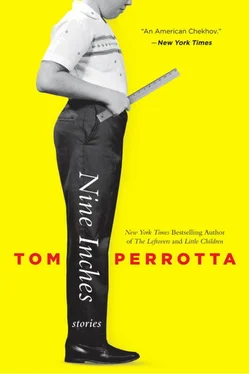Tom Perrotta - Nine Inches
Здесь есть возможность читать онлайн «Tom Perrotta - Nine Inches» весь текст электронной книги совершенно бесплатно (целиком полную версию без сокращений). В некоторых случаях можно слушать аудио, скачать через торрент в формате fb2 и присутствует краткое содержание. Город: Toronto, Год выпуска: 2013, ISBN: 2013, Издательство: House of Anansi Press Inc, Жанр: Современная проза, на английском языке. Описание произведения, (предисловие) а так же отзывы посетителей доступны на портале библиотеки ЛибКат.
- Название:Nine Inches
- Автор:
- Издательство:House of Anansi Press Inc
- Жанр:
- Год:2013
- Город:Toronto
- ISBN:978-1-77089-427-3
- Рейтинг книги:4 / 5. Голосов: 1
-
Избранное:Добавить в избранное
- Отзывы:
-
Ваша оценка:
- 80
- 1
- 2
- 3
- 4
- 5
Nine Inches: краткое содержание, описание и аннотация
Предлагаем к чтению аннотацию, описание, краткое содержание или предисловие (зависит от того, что написал сам автор книги «Nine Inches»). Если вы не нашли необходимую информацию о книге — напишите в комментариях, мы постараемся отыскать её.
Nine Inches — читать онлайн бесплатно полную книгу (весь текст) целиком
Ниже представлен текст книги, разбитый по страницам. Система сохранения места последней прочитанной страницы, позволяет с удобством читать онлайн бесплатно книгу «Nine Inches», без необходимости каждый раз заново искать на чём Вы остановились. Поставьте закладку, и сможете в любой момент перейти на страницу, на которой закончили чтение.
Интервал:
Закладка:
Lori tugged her shirt down in back and squinted at the catcher. Mark Diedrich’s face was beet red, as if something terribly embarrassing had already happened.
“Please, God,” I heard him mutter as Lori began her windup.
I should have been watching the ball, but instead I was thinking about Happy Chang and everything he must have been going through at the police station, the fingerprinting, the mug shot, the tiny holding cell. But mainly it was the look on his face that haunted me, the proud and defiant smile of a man at peace with what he’d done and willing to accept the consequences.
The ball smacked into the catcher’s mitt, waking me from my reverie. Mark hadn’t swung. As far as I could determine after the fact, the pitch appeared to have crossed the plate near the outside corner, though possibly a bit on the high side.
I guess I could have lied. I could have called strike three and given the game to the Ravens, to Lori Chang and Ray Santelli. I could have sent Mark Diedrich sobbing back to the dugout, probably scarred for life. But instead I pulled off my mask.
“Jack?” Tim was standing between first and second with his palms open to the sky. “You gonna call it?”
“I can’t,” I told him. “I didn’t see it.”
There was a freedom in admitting it that I hadn’t anticipated, and I dropped my mask to the ground. Then I slipped my arms through the straps of my chest protector and let that fall, too.
“What happened?” Mark Diedrich asked in a quavery voice. “Did I strike out?”
“I don’t know,” I told him.
Boos and angry cries rose from the bleachers as I made my way toward the pitcher’s mound. I wanted to tell Lori Chang that I envied her father, but I had a feeling she wouldn’t understand. She seemed relieved when I walked past her without saying a word. Mikey Fellner was out of the dugout and videotaping me as I walked past second base and onto the grass. He followed me all the way across centerfield, until I climbed the fence over the ad for the Prima Ballerina School of Dance and left the ballpark.
That’s what I wanted my ex-wife and children to see — an umpire walking away from a baseball game, a man who had the courage to admit that he’d failed, who understood that there were times when you had no right to judge, had responsibilities you were no longer qualified to exercise. I hoped they might learn something new about me, something I hadn’t been able to make clear to them in my letters and phone calls.
But of course I was disappointed. What’s in your heart sometimes remains hidden, even when you most desperately want it to be revealed. I remembered my long walk across the outfield as a dignified, silent journey, but on TV I seem almost to be jogging. I look sweaty and confused, a little out of breath as I mumble a string of barely audible excuses and apologies for my strange behavior. If Jeanie and the kids had been watching, all they would have seen was an unhappy man they already knew too well, fleeing from the latest mess he’d made: just me, still trying to explain.
Kiddie Pool 
IN A LIGHT RAIN, AT A LITTLE AFTER THREE IN THE morning, Gus Ketchell stood on his back stoop in slippers and shorty pajamas, holding a bulky cardboard box and staring uncertainly at his next-door neighbors’ garage.
Come on, he told himself. You can do this.
No one would ever know. The Simmonses’ house was dark, the old air conditioner wheezing away in the second-floor bedroom window. He pictured Peggy alone on the bed, snoring heavily, nearly comatose from the industrial-strength sleeping pills she’d been taking since Lonny’s sudden death a month ago. Gus could probably break down the front door with a sledgehammer, turn on every light in the house, and make himself a ham sandwich without disturbing her.
Gus’s own wife, Martha, was also asleep, but even awake she wouldn’t have registered his absence at this ungodly hour; aside from the occasional hotel room, they hadn’t shared a bed in years. There were no longer any dogs in the immediate neighborhood to sound an alarm, either, not since Fred DiMello had been forced to put down his ancient, slobbering basset hound last October. Fred had buried Sadsack in his backyard, and Gus often saw him staring forlornly at the circle of rocks he’d placed in the ground to mark the gravesite.
So the coast was clear. But still Gus hesitated.
He just didn’t like the idea of trespassing — breaking and entering, to be precise — even in a place so close to home, where he’d once been welcome. It would have been so much easier — so much more civilized — if he could just have rung the Simmonses’ doorbell in the morning and said, Hey, Peg, sorry to bother you, but I need a favor. And Peggy would have said, Sure, Gus, you name it. But why don’t you sit down and have a cup of coffee first?
Once upon a time, the Ketchells and the Simmonses had been those kinds of neighbors, back when everyone was young and their kids moved between the two yards as if they were all part of one big family. Lonny Simmons sometimes borrowed Gus’s wheelbarrow and extension ladder without asking; Gus did the same with Lonny’s ratchet set and Weedwacker. The Ketchells had an open invitation to swim in the Simmonses’ built-in pool, a bona fide luxury when it was installed in the early seventies, one of maybe a half dozen in the whole town. The two families barbecued together, went on camping trips, swapped babysitting, and took turns shoveling each other’s sidewalk when it snowed.
Somewhere along the way, though, it all went sour. The kids grew up and went away. Lonny filled his swimming pool with concrete, said the damn thing was too much trouble. Peggy got fat and haughty; she made some remarks that Martha hadn’t appreciated. There were grievances — a missing drill bit, a motion light that shined into a bedroom window. Gus and Lonny fell out of the habit of shouting jocular greetings to each other when they were both out in their yards. After a while, they stopped waving.
Nonetheless, relations between the two households had remained reasonably civil until about three years ago, when the Simmonses got a bee in their bonnet about the old oak tree in the Ketchells’ yard, which overhung both properties. Lonny and Peggy thought it was diseased and demanded that it be cut down before falling limbs damaged their precious garage. After a couple of tense discussions, Gus and Martha reluctantly agreed to get some estimates. They hadn’t even had time to make their initial calls when the mail carrier arrived with a registered letter containing vague threats of legal action if the tree was not cut down “with all due dispatch.”
A registered letter! From their next-door neighbors! Gus went ballistic. He scribbled a choice obscenity on the envelope and shoved it under the Simmonses’ front door, right back where it came from. From then on, it was War.
OF ALL the unpleasant memories, one particular episode still rankled. Last July, Gus’s three-year-old twin granddaughters had come for a visit during a wicked heat wave, the worst of the summer. Knowing how hard it was to entertain three-year-olds in the best of circumstances, he had purchased an inflatable kiddie pool from Costco, the biggest one they had. It came with something called a “high-volume hand pump,” which Gus had been assured was “extremely efficient.”
With an air of grandfatherly self-assurance, he removed the heavy vinyl liner from the box and spread it out on the grass. Squatting in the merciless sun, he pumped without making any visible headway, until his right hand was too raw to continue, then switched to his left. When that gave out — the pool still lay as flat as a rug on the parched grass, billowing slightly at its edges — he had no choice but to continue blowing up the damn thing with his mouth, while two whiny, pink-cheeked girls in swim diapers and bikini tops looked on with increasing impatience, criticizing his technique and questioning his competence.
Читать дальшеИнтервал:
Закладка:
Похожие книги на «Nine Inches»
Представляем Вашему вниманию похожие книги на «Nine Inches» списком для выбора. Мы отобрали схожую по названию и смыслу литературу в надежде предоставить читателям больше вариантов отыскать новые, интересные, ещё непрочитанные произведения.
Обсуждение, отзывы о книге «Nine Inches» и просто собственные мнения читателей. Оставьте ваши комментарии, напишите, что Вы думаете о произведении, его смысле или главных героях. Укажите что конкретно понравилось, а что нет, и почему Вы так считаете.












